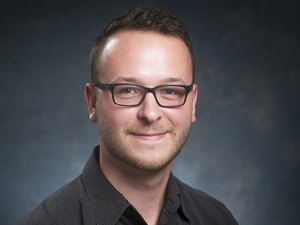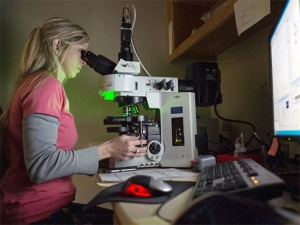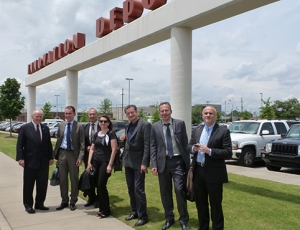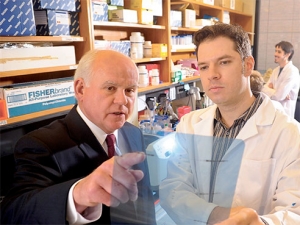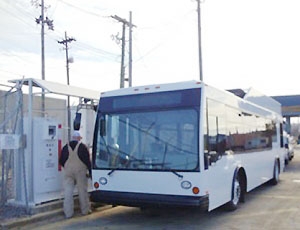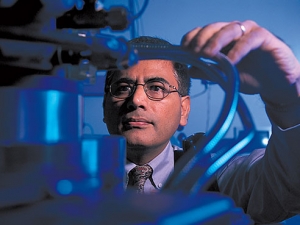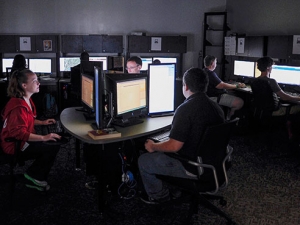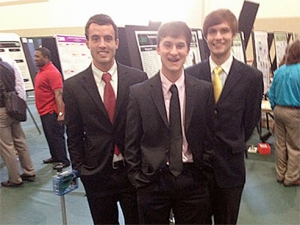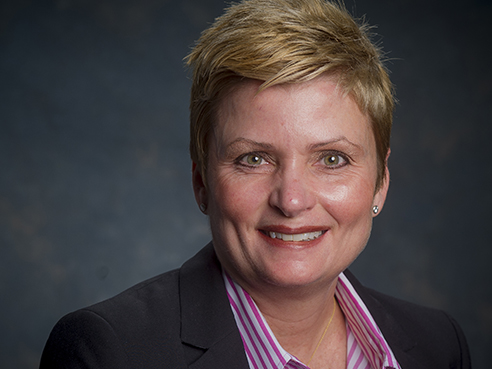 HIIE Executive Director Kathy Nugent says the new accelerator is "a place to innovate and be disruptive."UAB’s Bill L. Harbert Institute for Innovation and Entrepreneurship (HIIE) will present its annual innovation awards and officially launch the UAB Commercialization Accelerator 8-10 a.m. Aug. 21 in the Smolian International House. The event is free, but registration is requested.
HIIE Executive Director Kathy Nugent says the new accelerator is "a place to innovate and be disruptive."UAB’s Bill L. Harbert Institute for Innovation and Entrepreneurship (HIIE) will present its annual innovation awards and officially launch the UAB Commercialization Accelerator 8-10 a.m. Aug. 21 in the Smolian International House. The event is free, but registration is requested.
The new Commercialization Accelerator will be a key component of the university’s plan to attract innovators within the university, help them refine and develop their ideas and connect them to the city’s larger innovation ecosystem to grow and mature.
Elements of this exist throughout the university and community, but greater success demands something more seamless, said HIIE Executive Director Kathy Nugent, who is shepherding this project along with the newly created UAB Council for Innovation and Entrepreneurship.
Though still in its nascent stage, the accelerator will be a “process and place for university employees and students to bring an idea for a company where there is a mapped pathway for development and success — a place to innovate and be disruptive,” Nugent said.
Birmingham, in recent years, has developed a growing number of resources to support early growth and help prepare companies to create or compete in their markets, including Innovation Depot, Alabama Launchpad and the Birmingham Business Alliance. “But UAB must incrementally expand the pipeline of start-up companies we can deliver to them,” Nugent said. This past year, UAB launched six companies; the year before there was one.
Numbers are not a metric that exists in isolation. Increasing UAB’s capacity, efficiency and effectiveness increases the likelihood that companies can develop, launch, mature and produce jobs and revenue, Nugent said. “We will have more mature-stage companies to create jobs when there is a greater investment in the idea phase.”
Laying groundwork
During the past three years, UAB officials charged with improving the path from research to economic development have been working to increase company creation, technology licensing and sponsored research, in part to reduce dependence on federal grant revenue, Nugent said.
“2017 has been the best year ever,” she said, citing revenue of $9.82 million.
But how do we speed that process? One way is to make people feel a part of it.
The new Council for Innovation and Entrepreneurship, which Nugent co-chairs with Rubin Pillay, Chief Innovation Officer for the UAB Health System, assembled 24 representatives from the academic, medical and administrative units to devise, execute and communicate a plan to cultivate an entrepreneurial spirit that builds upon UAB successes and creates opportunities within the university, in Birmingham and beyond.
The group, which first met in March, has mapped the internal ecosystem of resources — education, training, mentoring, funding, labs and cores plus partnerships and collaborations. Now it is organizing work groups around five primary innovation areas — infrastructure, education, process support, translational actives and external collaboration — and will work to streamline connections between them and build stronger internal communities, Nugent said.
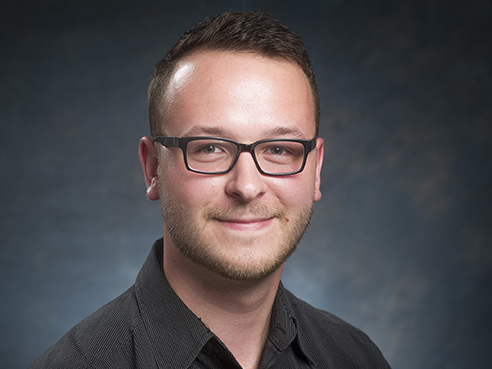 The new Commercialization Accelerator director, Max Polec, will help build bridges and raze silos that can slow innovation.A place and a new face
The new Commercialization Accelerator director, Max Polec, will help build bridges and raze silos that can slow innovation.A place and a new face
From an investment standpoint, the Accelerator is in what Nugent calls the “bootstrapping phase” — pulling together available space and resources to get up and running in its physical location in the Smolian International House. The new director, Max Polec, arrived on campus this week to help build bridges and raze silos that can slow innovation, Nugent said. “We are poised for success, and the Birmingham business community wants and needs us to succeed.”
Polec’s work here is partially supported by Venture for America, a two-year fellowship program that connects recent college graduates with startups in cities with emerging entrepreneurial systems. He graduated from the University of Pittsburgh with a bachelor of science degree in finance and a minor in economics this spring.
Polec, one of 18 VFA fellows living and working in Birmingham during the next two years, brings his own entrepreneurial bent and start-up experience with him. He was a member of a team, Papr Plane, that competed in the Blast Furnace, the University of Pittsburgh Innovation Institute’s student startup accelerator, with its idea for a social media platform that promotes the spread of quality content from one circle of friends to another. Another of his teams took third place in the institute’s Startup Blitz for its product, Solo Safe, a plastic cup with chemical sensors that can detect date-rape drugs. And he was among the winners of the mock-up phase of the 2016 Pitt Mobile App Challenge for Sylla-Sort, an app that would take a photo of a syllabus and use the data to add all the deadlines directly to a Google calendar.
“I plan to take what I have learned from competing through various collegiate innovation competitions and a university accelerator from the student perspective and use that experience to build out the UAB Commercialization Accelerator within the context of the needs and pain points at UAB and my new home, the city of Birmingham,” Polec said.Meet the council
Joining Kathy Nugent and Rubin Pillay on the UAB Council for Innovation and Entrepreneurship:- Suzanne Austin, senior vice provost
- Jim Bakken, assistant vice president, Public Relations
- Tom Brannan, vice president, Development & Alumni
- Chris Brown, vice president of Research
- Josh Carpenter, director of External Affairs, Office of the President
- Curt Carver, vice president, Information Technology
- Joel Dobbs, executive-in-residence, Business
- Alan Eberhardt, associate chair of education, Engineering
- Maikke Everts, director, Alabama Drug Discovery Alliance
- Bob Kimberly, director, Center for Clinical and Translational Science
- Patrick McNees, senior associate dean for Strategic Partnerships & Enterprise Development, Health Professions
- Holly Meadows, associate director, HIIE
- Jackie Moss, professor and Associate Dean for Technology and Innovation, SON
- Jason Nichols, assistant vice president for Industry Research
- Brian Pillay, chair, Materials Science & Engineering
- Mike Reddy, dean, Dentistry
- Steve Rowe, professor, Medicine
- Maria Shirey, chair of Acute, Chronic & Continuing Care, Nursing
- Yogesh Vohra, associate dean, College of Arts and Sciences
- Molly Wasko, associate dean, Business
- Jay Zhang, chair, Biomedical Engineering
- Yuliang Zheng, chair, Computer & Information Sciences, CAS
